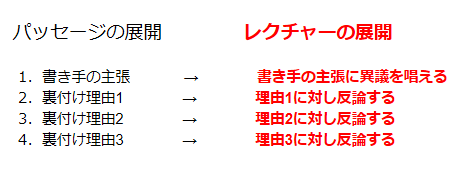
| TOEFL ライティング Task 1 レクチャーの聞き方
Integrated Writingの問題は、「レクチャーの内容を要約することと、それがどのように
リーディングの内容と関連しているかを述べること」です。
実際はこのように英文で出題されます。
Summarize the points made in the lecture, being sure to explain how they cast doubt specific points made in the reading passage.
和訳
「聞いた講義のポイントを、それがリーディングの内容に対し、どのように異議を唱えたかを説明しながらまとめなさい」
パッセージを読んだ後で聞くレクチャーは、基本的に、「パッセージの裏付け理由に
異議を唱え、矛盾点を提示する」という形式なので以下のような展開になります。

それでは実際のレクチャーを聞いてポイント(反論点)をまとめてみましょう

レクチャーのポイント(反論点)
ポイント(反論)1
The lecturer points out that there are other forms of writing that are of high quality and just as intellectually stimulating as literature.
ポイント(反論)2
The lecturer argues that people spend time on culturally valuable activities such as listening to good music or watching good movies. The definition of culture is changing.
ポイント(反論)3
The lecturer argues that maybe there is less readership of literature because the writers of literature nowadays are making their books/ works too hard to understand.
スクリプト
It is often said that people are reading less literature today than they used to. What should we make of this?
Well, first, a book doesn’t have to be literature to be intellectually stimulating. Science writing, history, political analysis, and so forth aren’t literature, perhaps, but they’re often of high quality. And these kinds of books can be just as creative and well-written as a novel or a play-they can stimulate the imagination. So don’t assume that someone who isn’t reading literature isn’t reading a good book.
But let’s say that people aren’t just spending less time with literature, they’re also spending less time with books in general. Does that mean that the culture is in decline? No. There’s plenty of culturally valuable material that isn’t written: music and movies, for example. Are people wasting their time when they listen to a brilliant song or watch a good movie? Do these non-literary activities lower cultural standards? Of course not. Culture has changed. In today’s culture there are many forms of expression available other than novels and poems, and some of these creative forms speak more directly to contemporary concerns than literature does.
Finally, it’s probably true that there’s less support for literature today than in earlier generations. But don’t be too quick to blame the readers. Sometimes it’s the author’s fault. Let’s be honest: a lot of modern literature is intended to be difficult to understand. There’s not much reason to suppose that earlier generations of readers would have read a lot of today’s literature either.







